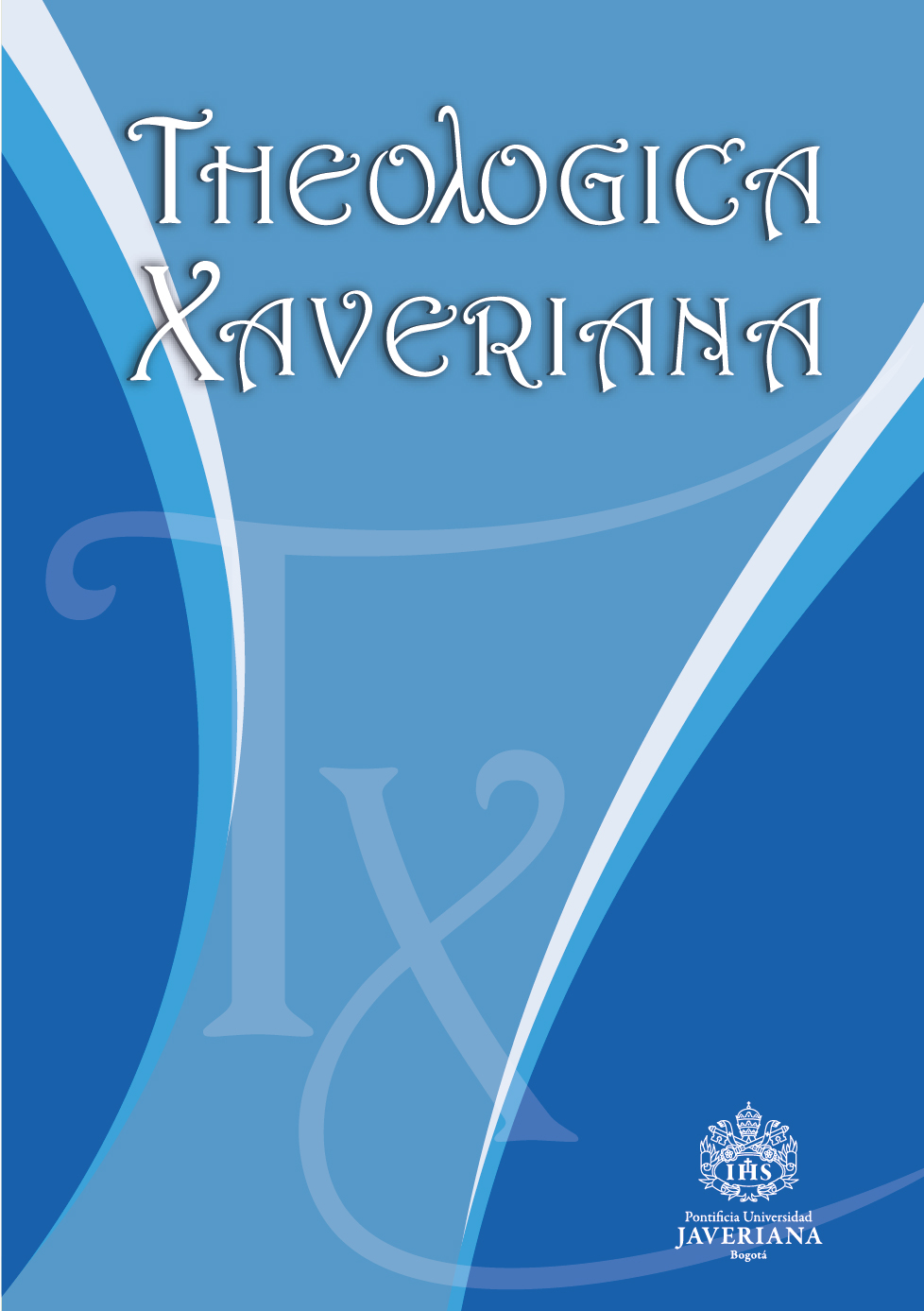Resumo
El corpus ignaciano se refiere al conocimiento de Dios con la afirmación conocer a Dios es conocer a Jesucristo (Ignatius, Ef 17,2a). Si bien esta afirmación se ve cualificada en otros pasajes (Ignatius, Rm 8,2b), no es claro inmediatamente cómo es Jesús el conocimiento de Dios. Es decir, no es claro si el conocimiento de Dios trata de escuchar a Jesús, mirar y seguir su ejemplo, o si conocer a Jesús es conocer a Dios; porque Jesús y Dios son uno, lo cual implica que conocer uno es conocer el otro.
La tesis de este ensayo consiste en que, para Ignacio, Jesucristo es el conocimiento de Dios, porque él revela en su vida y proceder, hasta su muerte, los propósitos de Dios. Recientes acercamientos a los estudios epistemológicos de los textos del Nuevo Testamento sugieren la necesidad de tratar el tema del conocimiento enfocándose en los lexemas que expresan dicho tema o concepto.
Tal ejercicio permite ordenar y categorizar los distintos usos y da claridad sobre cómo se entienden los distintos tipos de conocimiento. Al aplicar el trabajo de Ian W. Scott, se sugiere que Ignacio trata por lo menos cuatro tipos de conocimiento: conocimiento del mundano (conocimiento que se aprehende por observación de fenómenos de la esfera pública); conocimiento teológico (conocimiento sobre Dios, que requiere que Dios se revele a sí mismo); conocimiento ético (conocimiento sobre cómo comportarse como miembros de la iglesia); conocimiento experiencial (cuyo conocimiento no implica la concepción de un objeto, sino tiene que ver con saber algo por experimentarlo). Es una aplicación de esta taxonomía a Ignacio, quien al hablar de conocimiento de Dios o conocimiento teológico, se concentra en Jesús quien es el revelador de los propósitos de Dios con su muerte y los eventos de su vida.
Audi, Robert. “The Sources of Knowledge”. En The Oxford Handbook of Epistemology, editado por Paul K. Moser, 71-94. New York (NY): Oxford University Press, 2002.
Ayán Calvo, Juan José. Padres apostólicos. Madrid: Ciudad Nueva, 2000.
Carroll, John T. y Joel B. Green. The Death of Jesus in Early Christianity. Grand Rapids (MI): Baker Academic, 2007.
Cullmann, Oscar. The Christology of the New Testament. Traducido por S. C. Guthrie y C. A. M. Hall. Londres: SCM, 1959.
Downs, David J. “The Pauline Concept of Union with Christ in Ignatius of Antioch”. En Paul and the Apostolic Fathers, editado por Todd D. Still y David E. Wilhite, 143-161. London: Bloomsbury T&T Clark, 2016.
Foster, Paul. “The Epistles of Ignatius of Antioch (Part I)”. The Expository Times 117 (2006): 487-495.
_____. “The Epistles of Ignatius of Antioch (Part 2)” The Expository Times 118 (2006): 2-11.
Frei, Hans W. The Eclipse of Biblical Narrative: A Study in Eighteenth and Nineteenth
Century Hermeneutics. New Haven (CT): Yale University Press, 1974.
Fudge, Edward. “The Eschatology of Ignatius of Antioch: Christocentric and Historical”. Journal of the Evangelical Theological Society 15 (1972): 231-237. Disponible en: JETS, https://edwardfudge.com/wordpress/wp-content/uploads/2014/11/JETS_esch_Ignatius.pdf/
Hays, Richard. “‘Crucified with Christ’: A Synthesis of the Theology of 1 and 2 Thessalonians, Philemon, Philippians, and Galatians”. En Pauline Theology. Vol. 1: Thessalonians, Philippians, Galatians, Philemon, editado por Jouette M. Bassler, 227-246. Philadelphia (PA): Fortress, 1991.
_____. The Faith of Jesus Christ: The Narrative Structure of Galatians 3:1-4:11. Grand Rapids (MI): Eerdmans, 2002.
Holmes, Michael W. (ed.). The Apostolic Fathers Greek Texts and English Translations. Grand Rapids (MI): Baker Academic, 2007.
Isacson, Mikael. To Each Their Own Letter: Structure, Themes and Rhetorical Strategies in the Letters of Ignatius of Antioch. Stockholm: Almqvisit & Wiksell, 2004.
Lightfoot, J. B. The Apostolic Fathers. Part 2: S. Ignatius and Polycarp. 3 vols. London: MacMillan, 1885.
O’Keefe, John J., y R. R. Reno. Sanctified Vision: An Introduction to Early Christian Interpretation of the Bible. Baltimore (MD): The John Hopkins University Press, 2005.
Orbe, Antonio. La unción del Verbo. Estudios Valentinianos. Vol. III. Roma: Editrice dell’Universita Gregoriana,1961.
Pratscher, Wilhelm. The Apostolic Fathers: An Introduction. Waco (TX): Baylor University Press, 2010.
Rescher, Nicholas. Epistemology: An Introduction to the Theory of Knowledge. Albany (NY): State University of New York, 2003.
Richardson, Cyril C. The Christianity of Ignatius of Antioch. New York (NY): Columbia University Press, 1967.
Ryu, Jang. Knowledge of God in Philo of Alexandria. Tübingen: Mohr Siebeck, 2015.
Schoedel, William R., y Helmut Koester. Ignatius of Antioch: A Commentary on the Letters of Ignatius of Antioch. Philadelphia (PA): Fortress Press, 1985.
Scott, Ian W. Implicit Epistemology in the Letters of Paul: Story, Experience and the Spirit. Tübingen: Mohr Siebeck, 2006.
_____. Paul’s Way of Knowing. Story, Experience and the Spirit. Grand Rapids (MI): Baker Academic, 2009.
Thompson, Marianne Meye. The God of the Gospel of John. Grand Rapids (MI): Eerdmans, 2001.
Vainio, Olli Pekka. “Martin Luther on Perception and Theological Knowledge”. NZSTh (2015): 87-109. doi: https://doi.org/10.1515/nzsth-2015-0005/
Vall, Gregory. Learning Christ: Ignatius of Antioch and the Mystery of Redemption. Washington, D.C.: Catholic University Press of America, 2013.
Weinandy, Thomas G. “The Apostolic Christology of Ignatius of Antioch: The Road to Chalcedon”. En Trajectories through the New Testament and the Apostolic Fathers, editado por Andrew Gregory y Christopher Tuckett, 71-84. Oxford: Oxford University Press, 2005.
Wright, N. T. The New Testament and the People of God. Philadelphia (PA): Fortress Press, 1992.
Zahn, Theodor. Ignatius von Antiochien. Gotha: Perthes, 1873.
Zañartu, Sergio. El concepto de ‘zoe’ en Ignacio de Antioquía. Madrid: Eapsa, 1977.
Fuentes primarias
Aristóteles. Analytica posteriora (An Post)
_____. De anima
Ignatius, A los efesios (Ef)
_____. A los filadelfianos (Fila)
_____. A los magnecianos (Magn)
_____. A Polycarpo (Pol)
_____. A los romanos (Rm)
_____. A los esmirneanos (Smyrn)
_____. Alos tralianos (Tral)
Platón, Symposium
Platón, Theaetetus
Plotinus, Las Enéadas (Enn)
Porphyry, Eis ta harmonika Ptolemaiou hypomnēma
Proclus, “Comentario sobre Timaeus de Platón”

Este trabalho está licenciado sob uma licença Creative Commons Attribution 4.0 International License.



